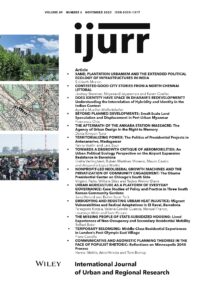Large-scale infrastructure projects have become a defining feature of African urbanism. The study of the surge in infrastructure investments has largely been conducted against the backdrop of a purported ‘neoliberal global modernity’ in which cities compete to attract international investments. This article draws on the case of Antananarivo, Madagascar’s capital, to contend with this framing and situate large-scale infrastructure projects within national political dynamics. We argue that infrastructural projects are primarily part of presidential strategies for political survival in a highly unstable and competitive political system, and that infrastructure is a key vehicle for consolidating and legitimizing presidential power by territorializing it. We explore how infrastructure projects have been used to channel state resources to key allies of the president while simultaneously anchoring presidential rule in Malagasy history and territory, reshaping state institutions and transforming spatial and political imaginaries of the state in the process. The article thus contributes to the growing literature that links urban policymaking to national politics by proposing a fine-grained account of the intertwined processes of city- and state-making under circumstances of competitive authoritarianism.
Details
Written by:
Fanny Voélin, Lars Buur
Digital Object Identifier (DOI)
https://doi.org/10.1111/1468-2427.13358
About DOI

